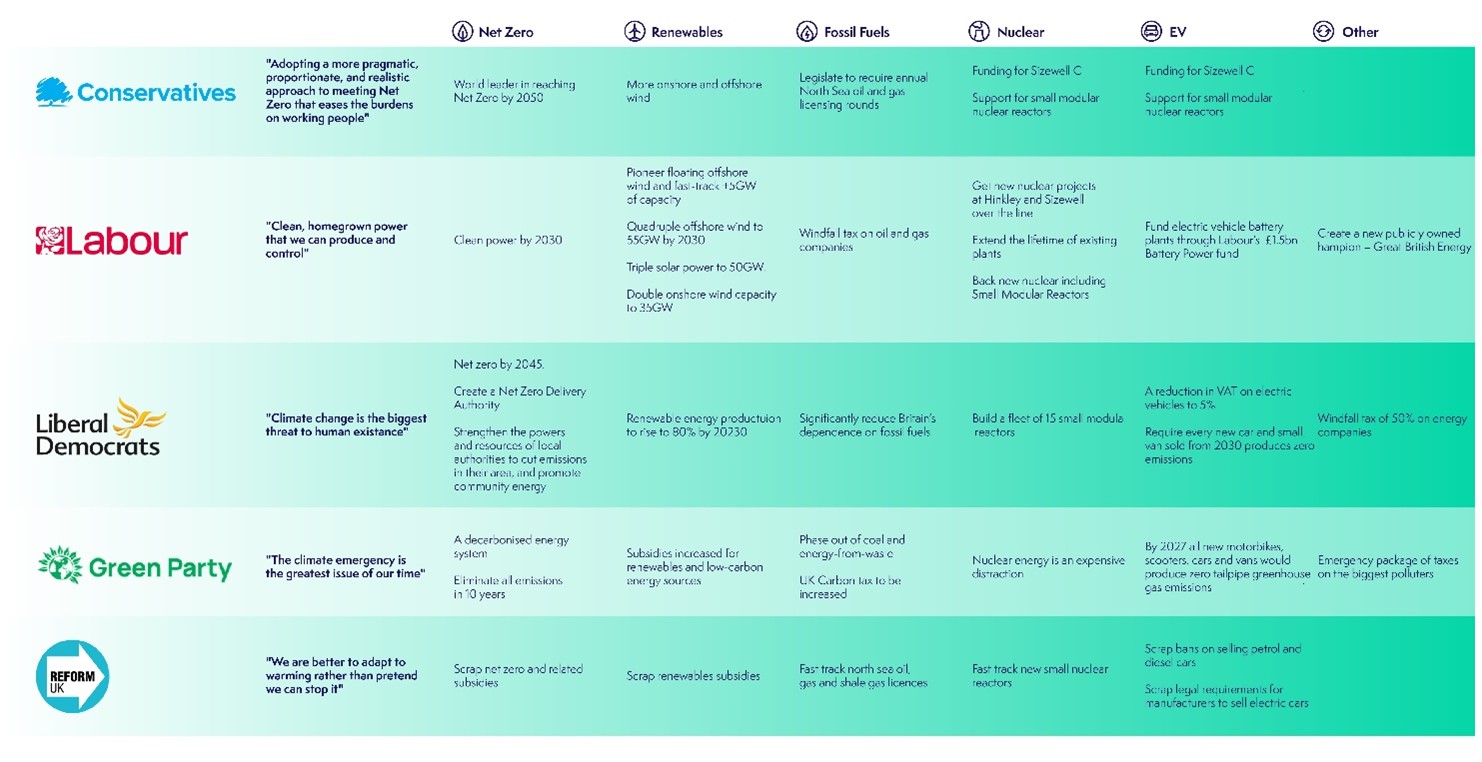News
better business decisions
Posted 1 year ago | 4 minute read

What does the general election mean for energy?
Prime minister Rishi Sunak’s recent announcement to hold a general election on Thursday 4 July has raised questions about the impact for the UK’s energy sector.
The general election comes at a geopolitically and economically formative period in the energy transition. The decisions of the next government will have ramifications for the UK’s energy system and industrial trajectory for decades to come. But with only six years to go for the UK to meet its 2030 climate and nature targets, including achieving a 68% reduction of carbon emissions compared to pre-industrial levels, net zero is expected to play an important role in the upcoming election.
But what are the parties commitments for the sector?

After 14 years in government, and with the Party’s manifesto to be released shortly, details of the policies and plans remain speculative. However, the Conservative Party is likely to reinforce its ‘five priorities’ as announced by Prime Minister Rishi Sunak in January 2023: halving inflation; growing the economy; reducing debt; cutting NHS waiting lists; and stopping illegal immigration.
The Conservative Party is expected to continue its commitment to achieving net zero by 2050 and tackling climate change with a “more pragmatic, proportionate, and realistic approach”. In addition to net zero, the Conservative Party is expected to highlighted its focus on improving energy efficiency and creating energy independence. This will likely be through increased investment in smart grid technology and energy storage solutions.
In recent months, the Labour Party has repeatedly stated its goal to make the UK “a clean energy superpower”. With the Party’s manifesto yet to be released ahead of the election, Labour have reinforced their ‘first steps for change’ initiative, covering six key areas, including: economy; NHS waiting times; boarder security; energy; antisocial behaviour, and teaching.
Within the Party’s ‘Make Britain a Clean Energy Superpower’ initiative, the Party states: “Ahead of the next General Election, Labour will set out more of our plans to tackle emissions in every sector of the economy to accelerate to net zero”. The Party’s ‘Green Prosperity Plan’ outlines a number of policies relating to improving energy efficiency and security, including the creation of Great British Energy, a new publicly owned clean power generation company.
Liberal Democrats leader, Sir Ed Davey, recently launched the Party’s election campaign by stating that there is “no ceiling on ambitions”. The Party’s key priorities are currently outlined as: a prosperous, innovative economy; fair access to good public services and a strong social safety net; a flourishing environment with fair access to nature for all; a strong United Kingdom and a fair international order; and a truly fair democracy, respecting everyone’s rights and empowering communities.
The Liberal Democrats have already announced their plans to cut greenhouse gas emissions to net zero by 2045. This is five years earlier than the current UK target. To achieve this, Sir Ed Davey outlined the Party’s plans to:
- invest significantly in renewable power, so that 80% of the UK’s electricity is generated from renewables by 2030.
- create a Net Zero Delivery Authority and promote community energy, including requiring all new homes to be fitted with solar panels.
- give local authorities a key role to cut emissions in their own area, including more powers and funding.
General Election Timeline
- 30 May: Parliament to be dissolved. All seats become vacant and official government work stops.
- 4 June: First debate between Rishi Sunak and Sir Keir Starmer.
- Mid-June: Party manifestos expected to be released
- 17 June: Deadline for registering to vote
- 18 June: Deadline for new postal vote applicants or for amending existing absent voting arrangements.
- 26 June: Deadline for new applications to vote by proxy.
- 4 July: Election day/Polling day.






